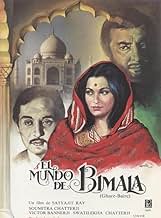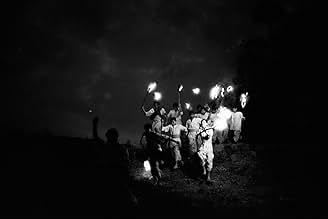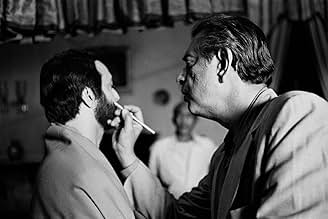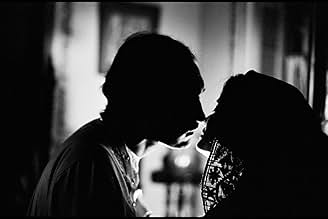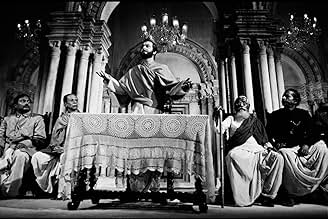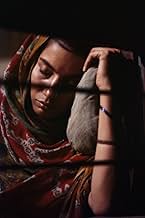IMDb RATING
7.5/10
2K
YOUR RATING
A landowner's wife emerges from seclusion through education, defying social norms. Her newfound freedom leads to political awakening when her husband's old friend brings revolutionary ideas ... Read allA landowner's wife emerges from seclusion through education, defying social norms. Her newfound freedom leads to political awakening when her husband's old friend brings revolutionary ideas to their door.A landowner's wife emerges from seclusion through education, defying social norms. Her newfound freedom leads to political awakening when her husband's old friend brings revolutionary ideas to their door.
- Director
- Writers
- Stars
- Awards
- 3 wins & 2 nominations total
Soumitra Chatterjee
- Sandip Mukherjee
- (as Soumitra Chattopadhyay)
Swatilekha Sengupta
- Bimala Choudhury
- (as Swatilekha Chattopadhyay)
Jennifer Kendal
- Miss Gilby
- (as Jennifer Kapoor)
Bimala Chatterjee
- Kulada
- (as Bimal Chattopadhyay)
- Director
- Writers
- All cast & crew
- Production, box office & more at IMDbPro
Featured reviews
The movie is played with a flashback, with a womans voice over. She is describing her life and her experiences. She is Bimala, the wife of Nikhilesh, a landlord and ruler of an area in West Bengal. She was married to him at a very early age. Bimala recollects how her husband helped her discover her true self, her dreams , aspirations and how she came to understand the meaning of life and love.
Nikhilesh(Victor Bannerjee , in a class act) , is Rajababu of a province. His people look upto him , and he is benevolent in his demeanour with them. He marries Bimala , but due to the prevalent child marriage traditions , there is a significant age gap between the two. Nikhilesh encourages his wife to explore a life beyond the mundane. He treats her as an equal rather than a submissive partner. Bimala takes English lessons (Jennifer Kendal Kapoor in a cameo) on Nikhilesh's insistence. Gradually as Nikhilesh encourages her to expand her horizons, she becomes more confident. Then enters Sandeep , a revolutionary and Nikhilesh's good friend. Sandeep and Nikhilesh are contrasting personalities. Nikhilesh is silent to Sandeep's vitriolic temperament. Sandeep talks of high ideals, while Nikhilesh thinks about the ground realities. A wonderful sequence where Sandeep is advocating boycott of English goods, while Nikhilesh differs , saying that the poor traders would be affected the most, not so much the English Saab. Bimala is swayed by Sandeep's idealistic words and admires him. Nikhilesh notices the same, when she doesn't take sides, but doesn't comment. Gradually the chemistry between Bimala and Sandeep increases, and while Nikhilesh is aware of it, he defends his silence to Bimala by saying that how will he come to know how much she values him, unless she does not compare his positives and negatives with anyone else. Suddenly a series of incidents show Bimala, a side of Sandeep , that she had not envisioned. During the course of these events she realises the true meaning of Nikhilesh's words to her , and during 'that' heated discussion which he and Sandeep had. While Nikhilesh is hurt by the change in Bimala's behaviour ,he says not a word. Slowly Bimala comes to know that the love respect admiration that she had read in books, was actually Nikhilesh's feelings towards her. How, he treated her as his equal (which in those days was unheard of), broadened her outlook towards life as a whole. Nikhilesh has a heart to heart talk with Bimala ,and drives out to face a riot in the village, while the law catches up with Sandeep. Bimala is left to reminisce all the events, it sums up the movie.
Nikhilesh(Victor Bannerjee , in a class act) , is Rajababu of a province. His people look upto him , and he is benevolent in his demeanour with them. He marries Bimala , but due to the prevalent child marriage traditions , there is a significant age gap between the two. Nikhilesh encourages his wife to explore a life beyond the mundane. He treats her as an equal rather than a submissive partner. Bimala takes English lessons (Jennifer Kendal Kapoor in a cameo) on Nikhilesh's insistence. Gradually as Nikhilesh encourages her to expand her horizons, she becomes more confident. Then enters Sandeep , a revolutionary and Nikhilesh's good friend. Sandeep and Nikhilesh are contrasting personalities. Nikhilesh is silent to Sandeep's vitriolic temperament. Sandeep talks of high ideals, while Nikhilesh thinks about the ground realities. A wonderful sequence where Sandeep is advocating boycott of English goods, while Nikhilesh differs , saying that the poor traders would be affected the most, not so much the English Saab. Bimala is swayed by Sandeep's idealistic words and admires him. Nikhilesh notices the same, when she doesn't take sides, but doesn't comment. Gradually the chemistry between Bimala and Sandeep increases, and while Nikhilesh is aware of it, he defends his silence to Bimala by saying that how will he come to know how much she values him, unless she does not compare his positives and negatives with anyone else. Suddenly a series of incidents show Bimala, a side of Sandeep , that she had not envisioned. During the course of these events she realises the true meaning of Nikhilesh's words to her , and during 'that' heated discussion which he and Sandeep had. While Nikhilesh is hurt by the change in Bimala's behaviour ,he says not a word. Slowly Bimala comes to know that the love respect admiration that she had read in books, was actually Nikhilesh's feelings towards her. How, he treated her as his equal (which in those days was unheard of), broadened her outlook towards life as a whole. Nikhilesh has a heart to heart talk with Bimala ,and drives out to face a riot in the village, while the law catches up with Sandeep. Bimala is left to reminisce all the events, it sums up the movie.
One doesn't expect anything other than excellence from the legendary Ray's work and 'Ghare Baire' (Home and the World) follows the same path. 'Based on the Nobel prize winner, Ranbindronath Tagore's novel, it focuses on the relationship of a woman with her husband and his best friend. Almost 10 years into her marriage, she is happy with her husband but craves for something more. Unlike many women of the time, her husband gives her complete freedom allowing her to live her life the way she wills. He himself is impressed by the British lifestyle and his his wife learn English. He's also very connected to his own Bengali route. Then enters his revolutionary and stubborn friend who is obsessed of having the country get rid of everything English. The husband and his friend have contradictory viewpoints. Yet, he welcomes his friend and never objects to his motivations, as long as he's within his limits. The wife is impressed and intrigued by his friend's political ambitions and is gradually drawn towards him (or he draws her towards him) until they embark in an affair and then the truth becomes more apparent...to everyone, but it's too late.
Ray really takes his time to tell us the story, to let us get to know the characters and clearly display the relationships between them and explain the political situation. He does one hell of a job doing it. He shows the development of the wife's 'relationship' with the friend as her marriage becomes weaker while her husband is hauntingly passive yet trying to understand both his wife and his friend as he is the one who truly loves her and he tries to carry out his social obligations towards his people. We see that the wife learns more about the political dilemmas in the outside world but only from the friend's point of view. Then, as one reviewer, has pointed we are drawn into a web of dilemma's between England and India, modernism and tradition, Hindu and Muslim, rich and poor, men and women, leadership and rabble-rousing, greed and sacrifice, means and ends and love and infatuation.
Master filmmaker that he is, Ray puts it all together in one of the most remarkable way that it does not deviate from the main plot. Ther performances are superb. Victor Bannerjee gives a very intense but subtle performance. In the end, one realizes that it is his character one feels most for. Contrastingly, though Soumitra Chatterjee is more vocal, he makes full use of his nonverbal language, hinting the character's deceitful intentions. Swatilekha Chatterjee plays a very difficult part with tremendous ease. She completely owns the role. Supporting cast are all very good. Ray also makes adequate use of the background score and the cinematography is wonderful. Watch for the camera angles and movement.
Truly a mind-blowing film and I always thought that there aren't enough words that can do justice to describe the excellence of Ray's films. I've only made an attempt and I'm still far behind. Just watch it to see what I mean. Only those who appreciate real cinema will understand.
Ray really takes his time to tell us the story, to let us get to know the characters and clearly display the relationships between them and explain the political situation. He does one hell of a job doing it. He shows the development of the wife's 'relationship' with the friend as her marriage becomes weaker while her husband is hauntingly passive yet trying to understand both his wife and his friend as he is the one who truly loves her and he tries to carry out his social obligations towards his people. We see that the wife learns more about the political dilemmas in the outside world but only from the friend's point of view. Then, as one reviewer, has pointed we are drawn into a web of dilemma's between England and India, modernism and tradition, Hindu and Muslim, rich and poor, men and women, leadership and rabble-rousing, greed and sacrifice, means and ends and love and infatuation.
Master filmmaker that he is, Ray puts it all together in one of the most remarkable way that it does not deviate from the main plot. Ther performances are superb. Victor Bannerjee gives a very intense but subtle performance. In the end, one realizes that it is his character one feels most for. Contrastingly, though Soumitra Chatterjee is more vocal, he makes full use of his nonverbal language, hinting the character's deceitful intentions. Swatilekha Chatterjee plays a very difficult part with tremendous ease. She completely owns the role. Supporting cast are all very good. Ray also makes adequate use of the background score and the cinematography is wonderful. Watch for the camera angles and movement.
Truly a mind-blowing film and I always thought that there aren't enough words that can do justice to describe the excellence of Ray's films. I've only made an attempt and I'm still far behind. Just watch it to see what I mean. Only those who appreciate real cinema will understand.
"The Home & The World" ( 1984) is based on a novel written by Rabindranath Tagore. It is a simple story of two friends, their friendship & love. Victor Bannerjee plays Nikhilesh, the maharaja while his friend's role is done by Soumitra Chatterjee who was former's class mate. The latter joins the maharaja to promote his political career. Maharaj's wife Bimala Chaudhury( Swatilekha Sengupta) develops a liking for him owing to his persuasive & impressive language. They get amorously involved. The story is reminiscent of Ray's earlier film made way back in 1964 titled " Charulata" featuring Soumitra Chatterjee, Syamal Ghosal, & Madhabi Mukherjee. Many things were common in both films. Both were based on stories by Rabindranath Tagore, the Noble laureate. Both films revolves round a childless married woman who falls for a persuasive speaking visitor, Saumitra Chatterjee ,while her husband watches the scene from the side lines as a passive spectators. In the later film the woman ,who was earlier confined to her 'palace chamber', gets an opportunity to meet the visitor & supports his 'swadeshi movement', too, despite her husband's disapproval. She even steals gold coins from the safe to lend a supporting hand .The film was made on a lavish canvass & it is very difficult to present each aspect or scene here. However, I tried to part with reasonably good information to readers. Interestingly, in both the films the woman returns to her husband .
'Ghare Baire' contemporarily known as 'The Home And The World' by Satyajit Ray is an adaptation of Rabindranath Tagore's novel of the same name. It is an allegory of sorts, which primarily revolves around the lives of Bimala, Nikhil and Sandip, in the backdrop of the Indian Swadeshi Movement in Bengal.
Bimala is married to Nikhil an opulent Bengali Landlord. Bimala was brought up to be the quintessential wife, who confines herself to her quarters in the Mansion, whose life revolves around her Husband's. She herself has no true existence of her own apart from being a wife to her husband. However, Nikhil, Bimala's husband is a man of modern ideals, who educates her wife, brings her out of her confinement and introduces her to the world and to Sandip. Sandip is the leader of the local Swadeshi movement who coaxes Bimala to take up his cause.
Sandip and Nikhil, despite being friends since college, are Men poles apart in Ideologies. Nikhil is a man of gentle disposition, who tends to concern himself more with the abstract than the material. He is obsequious to his virtues and morals, almost pedantic. Despite this austere way of life, he is a Liberal at heart and believes Bimala is free to make her own choices. He is a man always in scruples to do right by others, sometimes at his own expense. He intuits that the Swadeshi movement would create a social rift and doesn't support the cause despite Sandip's multiple attempts to persuade him.
Sandip on the other hand is a charming, promiscuous man. He is a confident, eloquent orator and a man of action. He doesn't concern himself with morality as long as he succeeds. He believes Men who accept their own despondency as destiny are weak men. If a man desires something he should persist to achieve it without having any scruples in regards to morality or the means involved.
When Nikhil introduces Bimala to Sandip, he opens up the world to her. But none could comprehend its consequences. When cajoled by Sandip, she agrees to take up his Swadeshi cause. She is now torn to choose between two Men of confounding ideologies. 'Ghare Baire' is the story of these consequences, the frailty of relations, and the the social rift so created by the Swadeshi movement in Bengal.
Satyajit Ray employs an ensemble cast including 'Victor Banerjee' as Nikhil, 'Soumitra Chatterjee' as Sandip and 'Swatilekha Sengupta' as Bimala. Along with them, Jennifer Kendal portrays Miss Gilby. The movie may seem slow paced to the viewer with long elaborate scenes and dialogues. However, Ray deftly dwells deep into the psyche and interrelationships of the protagonists and with the other characters such as Amulya and Nikhil's sister-in-law. Swatilekha Sengupta does a brilliant job in portraying Bimala's troubled tumultuous state of mind. And so do the other protagonists.
I was fortunate enough to have read Tagore's novel prior to watching the movie. Tagore's novel is considered, to some extent, to portray his own personal views on the Indian Swadeshi Movement. On reading more about Tagore one realises that he moulded Nikhil's character in his own light and through Nikhil he puts forth his political views.
Ray does his best to bring to life this vivid personal work, but, in my opinion, fails to completely do justice to Tagore's genius. This movie may not be Ray's best work, but it surely is one that stays on your mind and forces you to ponder. If that doesn't constitute art, then I don't know what does.
A Review by - Mohammed Saood.
Bimala is married to Nikhil an opulent Bengali Landlord. Bimala was brought up to be the quintessential wife, who confines herself to her quarters in the Mansion, whose life revolves around her Husband's. She herself has no true existence of her own apart from being a wife to her husband. However, Nikhil, Bimala's husband is a man of modern ideals, who educates her wife, brings her out of her confinement and introduces her to the world and to Sandip. Sandip is the leader of the local Swadeshi movement who coaxes Bimala to take up his cause.
Sandip and Nikhil, despite being friends since college, are Men poles apart in Ideologies. Nikhil is a man of gentle disposition, who tends to concern himself more with the abstract than the material. He is obsequious to his virtues and morals, almost pedantic. Despite this austere way of life, he is a Liberal at heart and believes Bimala is free to make her own choices. He is a man always in scruples to do right by others, sometimes at his own expense. He intuits that the Swadeshi movement would create a social rift and doesn't support the cause despite Sandip's multiple attempts to persuade him.
Sandip on the other hand is a charming, promiscuous man. He is a confident, eloquent orator and a man of action. He doesn't concern himself with morality as long as he succeeds. He believes Men who accept their own despondency as destiny are weak men. If a man desires something he should persist to achieve it without having any scruples in regards to morality or the means involved.
When Nikhil introduces Bimala to Sandip, he opens up the world to her. But none could comprehend its consequences. When cajoled by Sandip, she agrees to take up his Swadeshi cause. She is now torn to choose between two Men of confounding ideologies. 'Ghare Baire' is the story of these consequences, the frailty of relations, and the the social rift so created by the Swadeshi movement in Bengal.
Satyajit Ray employs an ensemble cast including 'Victor Banerjee' as Nikhil, 'Soumitra Chatterjee' as Sandip and 'Swatilekha Sengupta' as Bimala. Along with them, Jennifer Kendal portrays Miss Gilby. The movie may seem slow paced to the viewer with long elaborate scenes and dialogues. However, Ray deftly dwells deep into the psyche and interrelationships of the protagonists and with the other characters such as Amulya and Nikhil's sister-in-law. Swatilekha Sengupta does a brilliant job in portraying Bimala's troubled tumultuous state of mind. And so do the other protagonists.
I was fortunate enough to have read Tagore's novel prior to watching the movie. Tagore's novel is considered, to some extent, to portray his own personal views on the Indian Swadeshi Movement. On reading more about Tagore one realises that he moulded Nikhil's character in his own light and through Nikhil he puts forth his political views.
Ray does his best to bring to life this vivid personal work, but, in my opinion, fails to completely do justice to Tagore's genius. This movie may not be Ray's best work, but it surely is one that stays on your mind and forces you to ponder. If that doesn't constitute art, then I don't know what does.
A Review by - Mohammed Saood.
The Home and The World is an excellent film by the great Bengali director Satyajit Ray. Based on a novel by Tagore, the drama focuses on the personal and political dilemmas faced by a wealthy Bengali woman in 1907 as her husband and his best friend vie for her affection and her political loyalties.
Very few films successfully focus on the ethical complexities of social movement organizing (The Official Story, Matewan, and Mapantsula are rare exceptions; The Way We Were has some brilliant flashes along these lines, but then veers away from these themes all too quickly). We, the viewers, are initially drawn to the viewpoint of the charismatic political organizer, just as the protagonist is drawn to him and out of the restraints of traditional purdah. Far from painting the husband as a vile monster to revolt against, however, the husband encourages the increasing independence of the protagonist, and becomes the loving conscience of the film, even as it exposes the limitations of his apparent passivity.
As the attraction between the protagonist and the organizer mounts, so does the tempo and the tension of the political struggles in the village. As the protagonist learns more and more about the world beyond the secluded part of her palatial home, we, the viewers, begin to understand more and more the complexity of the cross-cutting tensions between: England and India, modernism and tradition, Hindu and Muslim, rich and poor, men and women, leadership and rabble-rousing, means and ends, and love and infatuation.
All this could have been ponderous or didactic, but it's decidedly not, and one of the wonders of the film is that the political issues are woven so deftly into the story of a believable unfolding love triangle. Most movies have a difficult time portraying any motivation for two characters to `fall' in love - this movie manages to portray changes in the relationships between all three main characters with such precision and intensity that I fully believed, and cared deeply, about each one.
The acting is extraordinary, and the cinematography, as is usual in Ray's films, is breathtaking, subtly accentuating the movie's themes of liberation and loss, and the interplay between the two.
Ray said his goal as a director was the same as Renoir's, to show that everyone has their reasons. As perhaps the most warmly compassionate of directors in all of world cinema, he succeeds brilliantly with this film.
Very few films successfully focus on the ethical complexities of social movement organizing (The Official Story, Matewan, and Mapantsula are rare exceptions; The Way We Were has some brilliant flashes along these lines, but then veers away from these themes all too quickly). We, the viewers, are initially drawn to the viewpoint of the charismatic political organizer, just as the protagonist is drawn to him and out of the restraints of traditional purdah. Far from painting the husband as a vile monster to revolt against, however, the husband encourages the increasing independence of the protagonist, and becomes the loving conscience of the film, even as it exposes the limitations of his apparent passivity.
As the attraction between the protagonist and the organizer mounts, so does the tempo and the tension of the political struggles in the village. As the protagonist learns more and more about the world beyond the secluded part of her palatial home, we, the viewers, begin to understand more and more the complexity of the cross-cutting tensions between: England and India, modernism and tradition, Hindu and Muslim, rich and poor, men and women, leadership and rabble-rousing, means and ends, and love and infatuation.
All this could have been ponderous or didactic, but it's decidedly not, and one of the wonders of the film is that the political issues are woven so deftly into the story of a believable unfolding love triangle. Most movies have a difficult time portraying any motivation for two characters to `fall' in love - this movie manages to portray changes in the relationships between all three main characters with such precision and intensity that I fully believed, and cared deeply, about each one.
The acting is extraordinary, and the cinematography, as is usual in Ray's films, is breathtaking, subtly accentuating the movie's themes of liberation and loss, and the interplay between the two.
Ray said his goal as a director was the same as Renoir's, to show that everyone has their reasons. As perhaps the most warmly compassionate of directors in all of world cinema, he succeeds brilliantly with this film.
Did you know
- TriviaBased on the book "Ghare-Baire" by Rabindranath Tagore. Director Satyajit Ray had previously written a screenplay from this book, but had sold the rights to a group who never filmed the story. 30 years later, Ray rewrote the screenplay for this film.
- ConnectionsReferenced in Z Channel, une magnifique obsession (2004)
- How long is The Home and the World?Powered by Alexa
Details
- Release date
- Country of origin
- Languages
- Also known as
- The Home and the World
- Filming locations
- Tollygunj, Kolkata, India(Studio Set)
- Production company
- See more company credits at IMDbPro
Box office
- Gross worldwide
- $6,951
- Runtime2 hours 20 minutes
- Sound mix
Contribute to this page
Suggest an edit or add missing content


